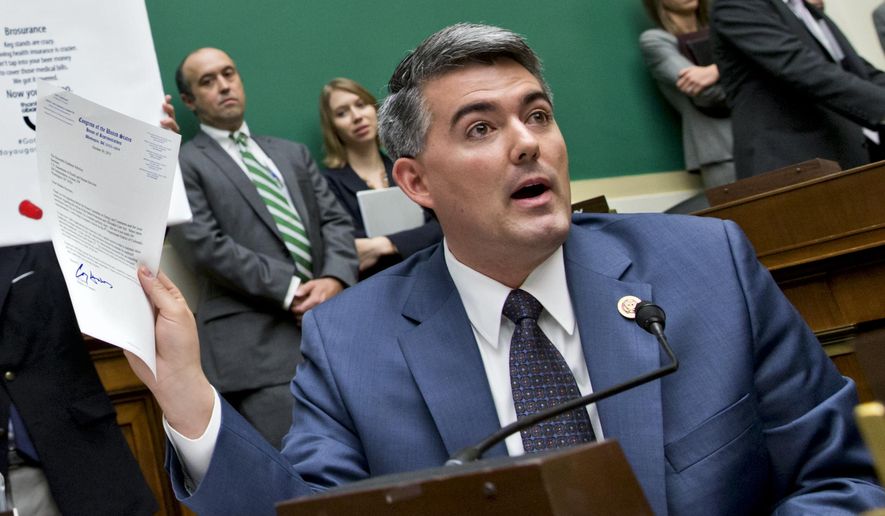UPDATE: The text of Gardner’s proposed law is now available here.
—
U.S. Sen. Cory Gardner (R-CO) says repeatedly that he wants to protect people with pre-existing conditions from losing their health insurance, yet he’s voted repeatedly to eliminate or gut the federal requirement that insurance companies cover people with pre-existing conditions.
Now Gardner has introduced a bill, the text of which has yet to be released, that would, according to a news release from the senator’s office, “guarantee Coloradans with pre-existing conditions have health insurance coverage protections.”
Experts say Gardner’s legislation appears to be motivated more by politics than substance, especially given that federal law, under Obamacare, as well as Colorado law already requires insurance companies to cover Coloradans with pre-existing conditions.
“Big picture, this seems to me like a late-in-the-day effort to protect the senator politically, given his support for repealing the pre-existing condition protections in the ACA in 2017 as well as public opinion about the Trump administration’s current efforts to undo pre-existing condition protections at the Supreme Court,” said Sabrina Corlette, a professor at Georgetown University’s Health Policy Institute.
Other health experts agreed with Corlette.
“To me, this is just a political stunt because these protections already exist at the federal and state level,” says Adam Fox, Director of Strategic Outreach for the Colorado Consumer Health Initiative. “This is pure politicking. If Gardner really wanted to help people with pre-existing conditions, he would protect the ACA, denounce the lawsuit against it, and make sure our Medicaid program is fully funded through the health crisis.”
If Gardner and other Republicans were to repeal the ACA (which they were unable to do in 2017 when they had the power to do so) and pass Gardner’s bill (which might narrowly protect people with pre-existing conditions), the “entire health care system would be thrown out of whack,” said Fox, predicting high premiums, millions of uninsured people, and the prevalence of so-called junk insurance, pushed by Trump and Gardner, that doesn’t cover what consumers expect from health insurance.
“If you have the protections for people with pre-existing conditions, but you don’t have some of the other protections, like essential health benefits, no annual and lifetime [coverage] limits, and preventive services, you could end up with insurance that, yes, you technically could buy, but it wouldn’t cover much of what you need without the ACA.”
Gardner has yet to address these concerns.
“My bill is simple – it guarantees coverage for people who have pre-existing medical conditions and ensures that people cannot be charged more because of a pre-existing condition,” said Gardner in a news release. “I will continue to fight for pre-existing condition protections as well as measures to lower health care costs, strengthen innovation, and expand access for all Coloradans, including those with pre-existing medical conditions.”
With the details of Gardner’s bill unavailable, it’s not known if his legislation would be contingent on the repeal of Obamacare, since protections for pre-existing conditions already exist under the ACA.
Analysts speculated that Gardner’s bill may be loosely modeled on a U.S. Senate bill introduced last year by North Carolina Sen. Thom Tillis, who also faces a tough re-election campaign in November. There’s also a U.S. House bill introduced last year that would kick in if Obamacare were repealed and health insurance companies were no longer required to cover people with pre-existing conditions.
Gardner’s bill comes with the election looming and health care again surging as a critical issue. Like other Republicans in close races nationwide, Gardner has faced repeated criticism for saying he wants to protect people with pre-existing conditions but voting against their interests–and having no concrete replacement plan for Obamacare.
The text of Gardner’s bill, which was introduced on Aug. 6, should be posted shortly, according to a congressional website.
Without explanation, the publication of the bill’s text has been delayed over a week beyond the length of time the text of a bill is expected to be published once the title is available.
“Bills are generally sent to the Library of Congress from GPO, the Government Publishing Office, a day or two after they are introduced on the floor of the House or Senate,” states the Congress.gov on the page where the text of Gardner’s bill is supposed to appear. “Delays can occur when there are a large number of bills to prepare or when a very large bill has to be printed.
Gardner’s office didn’t return a call seeking comment on the delay or on multiple questions related to his stance on Obamacare and pre-existing conditions.




